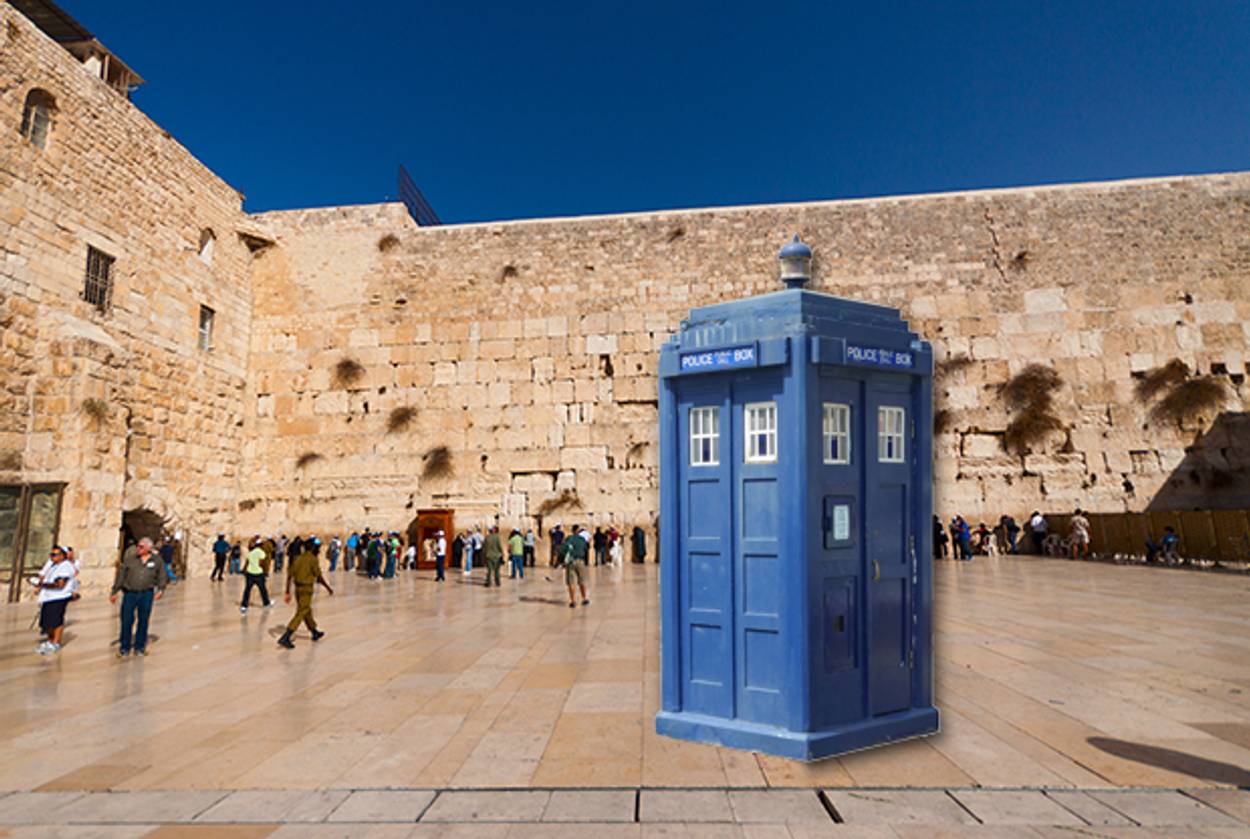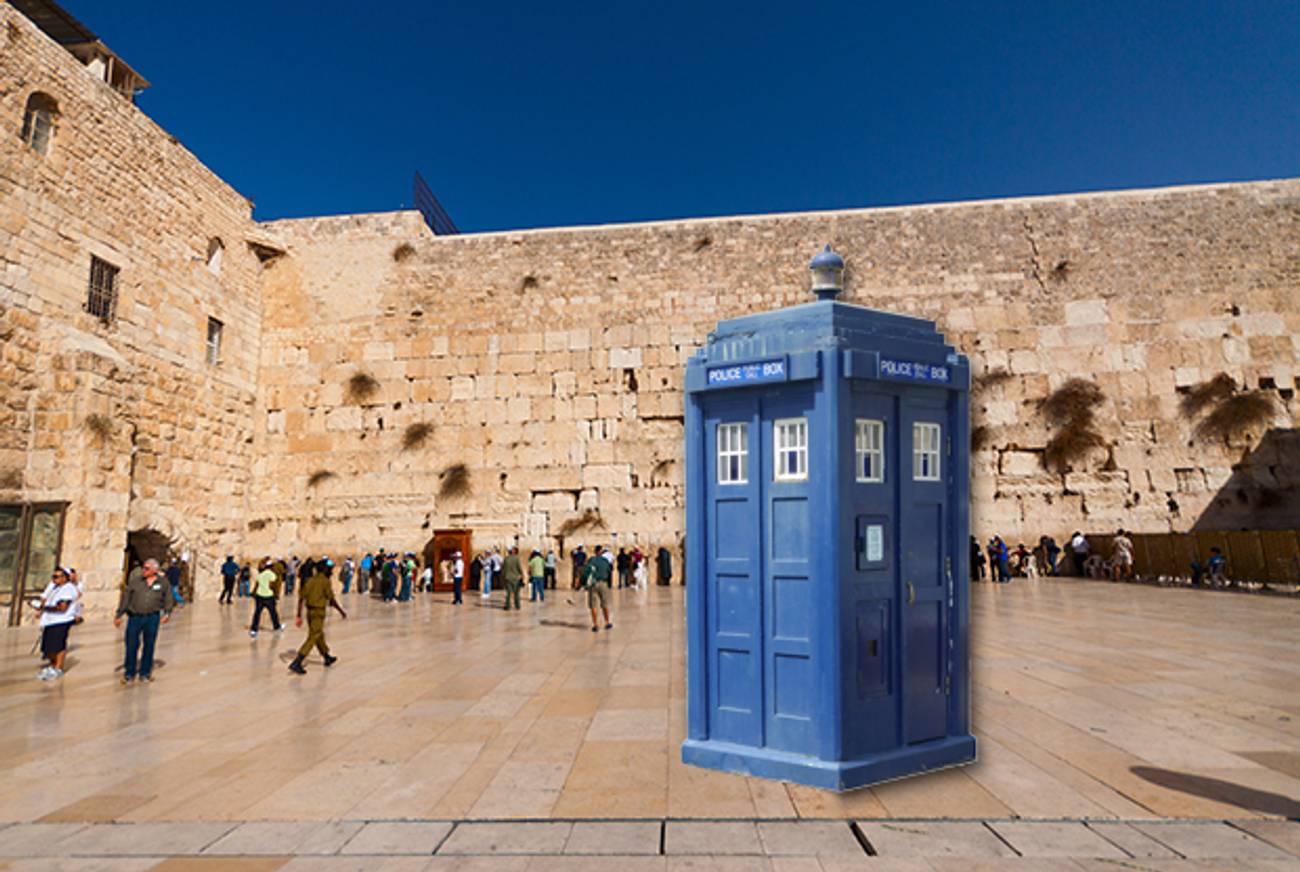Doctor Who? Doctor Jew
The iconic sci-fi hero is the greatest Jewish character in the history of television




There are few undertakings more daunting for a writer interested in popular culture than to attempt to write, coherently and elegantly, about Doctor Who. For one thing, the sheer size of the monumental television series is daunting: To date, 796 episodes have aired, clocking in at various lengths and representing divergent runs, story arcs, and seasons. Famously, the Doctor, a member of a superior race called the Time Lords, occasionally slips into a new body, acquiring not only a new face but also a new personality. Eleven actors have portrayed him thus far, making any attempt at coherent characterization an exercise in footnotes and futility. Finally, being not only one of the most successful science-fiction franchises but also one of the most intellectually intricate, any attempt to dive into its philosophical depths is fraught with risk—the show’s universe is so rich and dense that unless a writer is very careful, he or she may very well end up finding hidden meanings in everything.
And yet, here I go. With the series’ seventh season ending next week, and with a stunning twist promising to rock the tenets of the Doctor’s world, allow me, by way of playful tribute, to suggest that the esteemed time-traveling do-gooder is the most compelling Jewish character in the history of television.
He was created by Sydney Newman, who was born in Toronto to Russian Jewish immigrants who struggled to get by, running a small shoe shop. He dropped out of school at 13, enrolled in a technical academy, and studied art and design. He was good enough to secure a job with the Walt Disney Company but failed to gain a work permit. Defeated, he returned to Canada, joined the National Film Board there, and spent World War II making a series of propaganda films named, in an anodyne and unmistakably Canadian way, Canada Carries On. A talented director and producer, he eventually found his way across the sea, taking a position with the BBC. In 1963, a few months after his arrival, he came up with the idea for Doctor Who.
It’s not too difficult to spot traces of Newman’s own roots in his creation. His hero is wildly intelligent, intergalactically cosmopolitan, with a biting sense of humor and a commitment to quite literally repairing the world. He is constantly wandering, never at home. His relation is not to space, a place to call his own, but to time, which makes him highly dependent on memory. In one revealing exchange, a companion tells the Doctor that “before this war began, I was a father and a grandfather. Now I am neither.” Nodding sympathetically, the doctor replies: “Yeah, I know the feeling.” On another occasion he suggests that his family sleeps in his mind, a haunting intimation of loss.
Naturally, a gentleman such as this is never wanting for enemies. The Doctor is surrounded by a host of belligerent warlike species who view him, alternatively and sometimes simultaneously, as both pesky and effete and oddly omnipotent. Most celebrated among these baddies are the Daleks, mollusk-like beings who encase themselves in an armored suit slightly resembling a salt shaker. Their creator, a writer named Terry Nation, grew up in wartime Wales and was never able to shake off the profound terror of observing Germany and witnessing an entire nation unite under a murderous maniac and seek to exterminate everyone whom it regarded as inferior. When Nation joined Newman at the BBC, he wasted no time introducing “the unhearing, unthinking, blanked-out face of authority that will destroy you because it wants to destroy you.” Armored, slow-moving, and infinitely menacing, the Daleks’ catchphrase is “Exterminate!”
With this timeless conflict at its center—the canny Jew versus the canned Nazis—Doctor Who ran for 26 seasons, finally fading away in 1989. By 2005, however, the British were ready to reunite with their seminal cultural icon, and the Doctor was revived. All the old enemies were back for another run—including the Master, a self-hating Time Lord who despises the Doctor’s charitable endeavors—but new and infinitely more terrifying ones were also introduced, making the show’s Jewish themes even less subtle.
Chief among them were the Silence, a deformed race that has been living alongside humanity for millennia. Their terrifying quality is that they’re only remembered when they’re seen and are forgotten immediately thereafter. They travel the world with the sole purpose of assassinating the Doctor, lest he answer the oldest question in the universe. That question? It’s right there in the show’s title: Doctor Who?
Without getting too theological—although the show has, casting The Silence as a religious order devoted to ancient prophecies—it is hard not to think of the whole affair as a meditation on God, a riff on that old Exodus chestnut in which the Creator insists that no man shall see his face and live. Learning the Doctor’s name—in 796 episodes, it is not mentioned once, and it is strongly suggested that he himself neither knows it nor wishes to know it—means unlocking all of the universe’s secrets, shedding light on its mysteries, closing the distance between mere mortals and other, higher beings whose job it is to watch over us humans and shower us with kindness and light.
And yet this is precisely what is going to happen next week. Steven Moffat, the creative force behind the series’ current reincarnation, has promised that the revelation will shake the show to its core, sending fans into fits of speculation: Once we know the Doctor’s name, does he cease to be the wondrous being that he is? Do The Silence die off? Would the world still exist?
To those not blessed with the Who obsession, the whole premise may seem silly. But it’s been a very long time since a television show took metaphysical questions so seriously and answered them in a way that was so profoundly Jewish. I won’t be surprised if the Doctor’s name turns out to be Shlomo; whatever it is, I’ll continue following him religiously, and so, dear reader, should you.
***
Like this article? Sign up for our Daily Digest to get Tablet Magazine’s new content in your inbox each morning.
Liel Leibovitz is a senior writer for Tablet Magazine and a host of the Unorthodox podcast.
Liel Leibovitz is editor-at-large for Tablet Magazine and a host of its weekly culture podcast Unorthodox and daily Talmud podcast Take One. He is the editor of Zionism: The Tablet Guide.